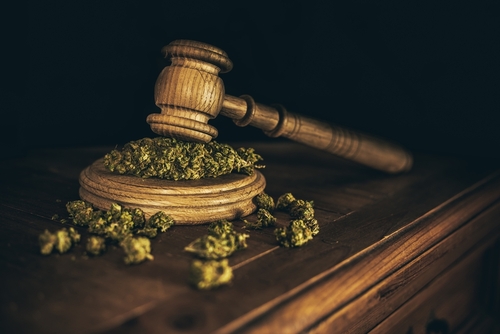The U.S. House of Representatives on Friday passed landmark federal legislation to legalize marijuana, although the measure faces an uncertain future in the U.S. Senate.

The Marijuana Opportunity Reinvestment and Expungement (MORE) Act, H.R. 3617, was approved by the House in a bipartisan 220-209 vote. It is the second time that marijuana decriminalization legislation has been passed by the House, the last time being in December 2020, but it stalled in the U.S. Senate.
“Whatever one’s views are on the use of marijuana for recreational or medicinal use, the policy of arrests, prosecution, and incarceration at the Federal level has proven both unwise and unjust,” House Judiciary Committee Chairman Jerry Nadler (D-NY) said in remarks on the House floor on Friday. “That is why the MORE Act would set a new path forward and would begin to correct some of the injustices of the last 50 years,” added Nadler, who sponsored the MORE Act.
Specifically, the bill removes marijuana from the list of scheduled substances under the Controlled Substances Act and eliminates criminal penalties for an individual who manufactures, distributes, or possesses marijuana. However, the legislation would not undermine the ability of states to apply their criminal laws to marijuana or to legalize and regulate it as they see fit, Rep. Nadler said.
The bill would initially impose a 5 percent sales tax on cannabis products produced in or imported into the United States and an occupational tax on cannabis production facilities and export warehouses. Revenues from the tax on marijuana sales would be directed to an Opportunity Trust Fund to support various programs and services for individuals and businesses in communities impacted by the war on drugs.
Additionally, under the legislation, the Small Business Administration is expected to provide an estimated $1.4 billion in grants to states and local governments for making business loans to cannabis-related small businesses.
“We’re long past due for the reforms in the #MOREAct,” U.S. Rep. Ed Perlmutter (D-CO) tweeted on Friday. “We must take action to end unjust marijuana policy, uphold states’ rights & ensure the safety & equity of legal businesses. The House once again took action to pass meaningful cannabis reform & I urge the Senate to do the same.”
The measure will next be considered by the U.S. Senate, where its future is unclear.
Senate Majority Leader Chuck Schumer (D-NY) has said comprehensive federal cannabis reform with equity for the communities most impacted by the war on drugs is a Senate priority. He is expected to introduce his own cannabis legislation soon.
A March 30 Congressional Budget Office (CBO) report said the CBO and Joint Committee on Taxation estimate that H.R. 3617 would increase net revenues by about $8.1 billion over the 2022-2031 period by creating an occupational tax on cannabis producers and warehouse operators and by increasing compliance with business income taxes. CBO estimated that about $7.8 billion would be appropriated to the Opportunity Trust Fund over the 2022-2031 period, of which the Department of Justice would spend about $3.4 billion to provide job training and legal aid, among other services, to people harmed by the war on drugs.
The legislation would reduce the number of people in federal facilities for federal cannabis offenses and the amount of time they serve, leading House Speaker Nancy Pelosi (D-CA) to call the legislation one of the most important criminal justice reform bills in recent history.
U.S. Rep. Barbara Lee, co-chair of the Congressional Cannabis Caucus, said on Twitter: “Make no mistake: Yes, it IS a racial justice bill…We must end this failed policy of marijuana prohibition, which has led to the shattering of so many lives – primarily Black and Brown people.”
Similarly, the U.S. Cannabis Council tweeted on Friday, “Descheduling cannabis IS criminal justice reform, and the CBO’s new score of the MORE Act shows why. Making the #MOREAct the law of the land would reduce time served in federal prisons by an estimated 37,000 person-years over the next decade alone.”
A total of 37 states and the District of Columbia have legalized medical cannabis, while 18 states and D.C. have legalized cannabis for adult recreational use, according to data cited by the National Conference of State Legislatures last month.